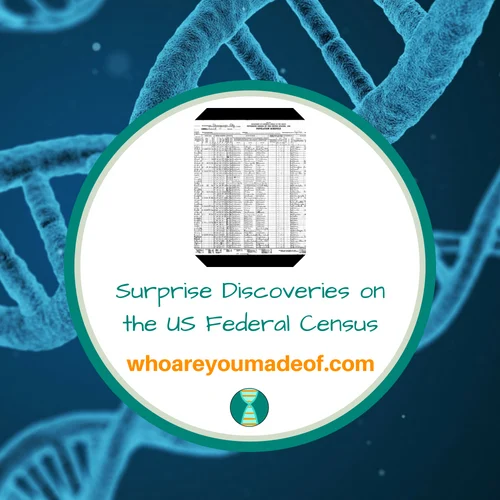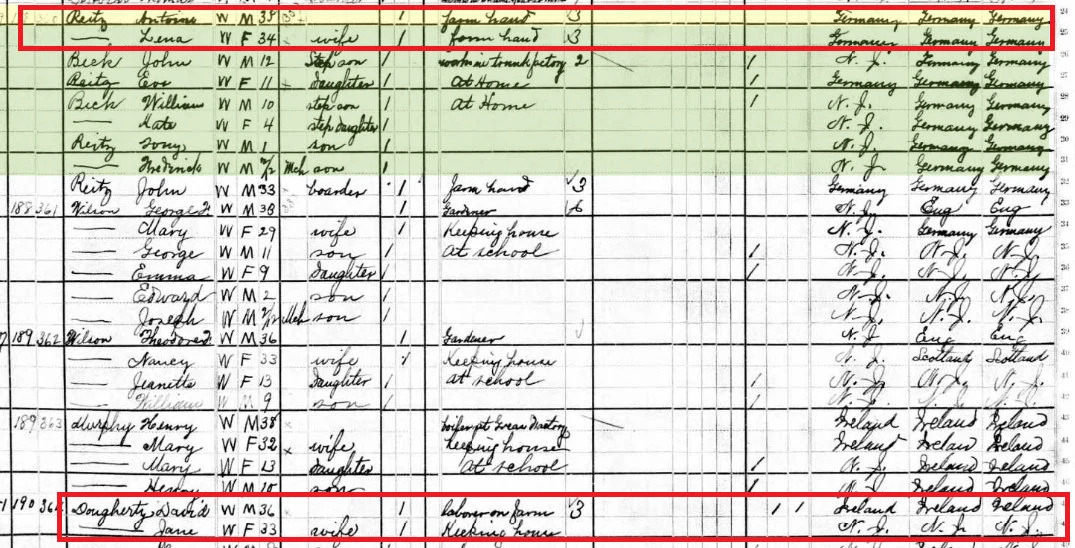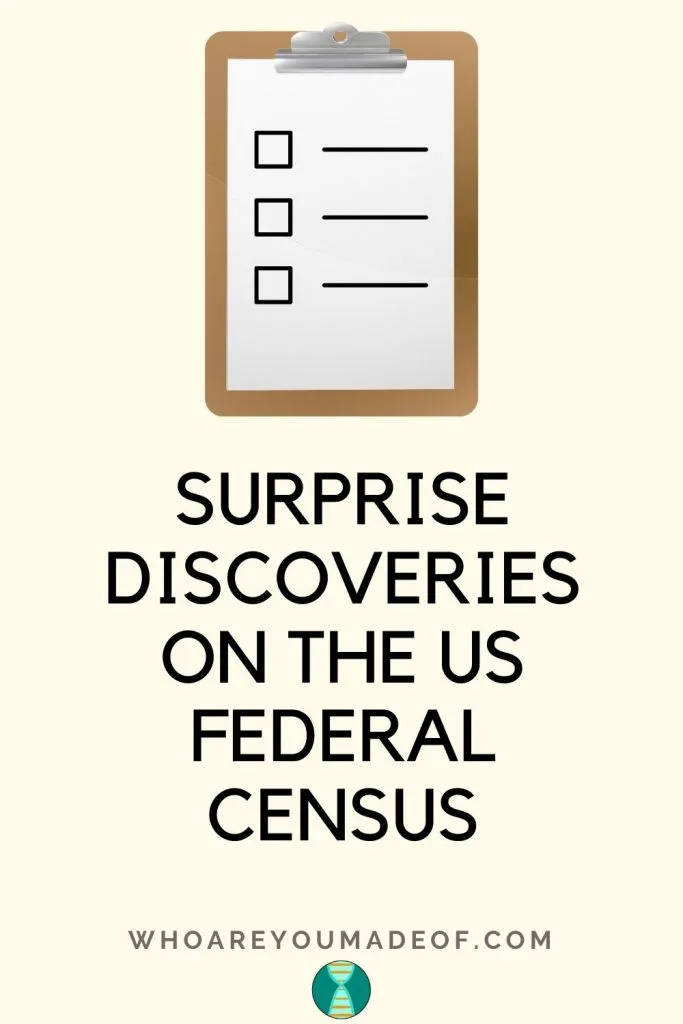What’s the craziest thing you have ever seen on an old census record? US Federal Census records are filled with seemingly dry, boring entries documenting family size, head of household, and employment statistics for people living all over the country.
If you look closely (and sometimes read between the lines) you might find something hilarious, heart-breaking, mysterious, or even life-changing. In this post, I’ll share some census discoveries that surprised me with you.

I’d love to hear from you in the discussion at the end if you would like to share something that you found surprising on a census record! All of the stories that I share here are ones I discovered during my own family research, and I bet many of you have even more interesting stories to tell.
I am fully aware that not everyone considers going through old census records fun, or even finds themselves laughing (or crying) at what they find. Even so, I bet that there is a big group of people out there that get a kick out of what they find in the census, and this post is for you!
Exaggerated Claims on the Census
The first time something on a census record struck me as funny was when I was looking for information about my 5th great-grandfather, Andrew Taylor. He was born in England, but he died in New Jersey.
I was pretty sure I could locate him on a US Federal Census, and I did. He was reported on the 1830, 1840, and 1850 census records. The 1850 census was one of the first records that contains more than just the name of the head of household and number of people living there.
I am happy that I was able to find my great-great-great-great-great grandfather in the 1850 census, but I got a chuckle from the occupation that he self-reported. He called himself a “gentleman”.

To me, the word gentleman evokes an image of a man who manages his estate and doesn’t necessarily do “real” work. A man of means, or even the lord of the manor.
My Andrew Taylor is listed as living in Newark’s 5th Ward in 1850, a part of Newark located on the Passaic River in New Jersey, and while I don’t know the exact details of his financial situation, I don’t have any reason to believe that he was wealthy in any way. Their neighbors were gardeners, farmers, and laborers.
To be fair, I did find another “gentleman” listed on this census in Ward 5, so who knows?
Descendants of Census Neighbors Married Each Other
One strategy I always recommend to people using census records for their research is to read the rest of the census page, as well as the page preceding the one that contains information about your ancestors, as well as the next page.
You literally never know who was living near your ancestors at the time. They may have chosen that neighborhood because of family ties, or there may be some other person or family of interest living nearby.
In the 1880 Census, again in Newark, I found my great-great-great grandparents, the Funks from Germany. I’ve been trying to piece together some information that seems to not make sense from their lives, so of course, I was checking the rest of the census record.
Lo and behold, I saw my other great-great-great grandparents, the Doughertys. These families were not related to each other in any sense, and are on two completely different sides of my family, and they only lived two street numbers away from each other.

The great-grandson of the Dougherty family and the great-granddaughter of the Funk family ended up marrying. It seems to be to be highly unlikely that these two families knew each other well, or even at all, especially in a city as populated as Newark, even in the 1880s.
Even if they did know each other as neighbors, what are the odds that they stayed in touch long enough for their great-grandchildren to meet and marry?
The cool thing about this story is that the great-grandchild of the Doughertys and the Funks are my grandparents! I’m sure glad that they met, no matter how it happened.
Incredible Loss Detailed on the Census
While I was researching one line of my family that lived in the Chicago area, I noticed a different (unrelated) family on the census that had lost an incredible number of children. In some of the census years beginning in 1890, the Federal Census included questions about how many children a woman had given birth to, and how many of these children were surviving.
In all of the hours that I have spent reading census records, I have seen many situations where a family has lost multiple children, but none struck me as much as the woman named Ellen who was my great-great grandfather’s neighbor. She reported that she had had 11 children, but only 4 were surviving.
I’m so grateful to live be alive in 2018 and be raising my family with the benefits of modern medicine, safe food and water, and clean air. It’s easy to forget how much our forefathers, and especially our “foremothers”, suffered and struggled.
My great-great grandmother was a boss – I saw it on the census
On the 1930 Census, I saw something pretty cool. Even though during the same time period one of my other female ancestors had to lie about her marital status to get a job, my great-great grandmother on my dad’s side had her own grocery store!
When I located this family on the census records, I noticed that my great-great grandfather, Floyd, was the manager of a shoe store – nothing spectacular, especially by today’s standards. His wife, Mabel, however, is listed as the proprietor of a grocery store.
She is the only married woman on that page of the census listed with a profession.
Also, I have found no evidence that a grocery store was a business that she may have inherited (her dad was a farmer). Go great-great grandma! I’m glad there is a photograph of this super cool boss woman holding me when I was a baby.

My great-great-great grandfather was a janitor
I don’t know much about my great-great-great grandfather, Ferdinand. The only details I have about his life are from the census records pertaining to his life here, and the sparse information contained about him on the passenger manifest when he came to America.
I’m still working on his line, but I think I already know the most important thing about him. He was reported as a janitor in all of the census records that I could for him during his working years.
All seriousness aside, it’s also shocking that he was able to afford to support his entire family on a janitor’s salary!

My 3rd great-grandfather Ferdinand had the classic 1800’s immigrant experience. I don’t know what he left behind in Germany, but it was worth it to him to work hard as a janitor in Chicago his whole life in order to have the opportunity to raise his family in the United States.
His children, grandchildren, and great-grandchildren went on to do amazing things in their life – all due to the incredible sacrifice that this man made for them to have opportunities.
Ferdinand was not the only person in my family tree to perform hard work in order to raise his family in this country, and it occurred to me that many, many people had made great sacrifice in order to come here – all so that I, their descendant, could make the most of the life that can be found here.
I took a long time looking at my life, wondering if I have squandered or taken advantage of the opportunities that they gave me. Definitely something to ponder!

Conclusion
I hope that you have enjoyed this post, and that it has made you curious about what you might find about your own ancestors on the US Federal Census records. If you have already researched your family and have found something interesting, cool, sad, or amazing, I would love to hear from you in the comments below.
Thanks for stopping by!

Susan
Sunday 9th of May 2021
I recently spoke with my cousin who is well up in his 90’s about our family history. He told me what sounded like a crazy story about two brothers who married their nieces who were sisters. Thankfully, he remembered their names. I found them on a census record all living in the same house, that of the girls’ parents! The two brothers (the girls’ uncles) were listed as son-in-law on the record! I had proved the crazy story which also provided the proof I was lacking showing that my family was indeed related to that branch!